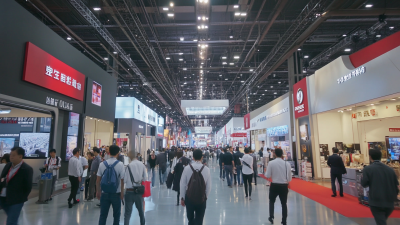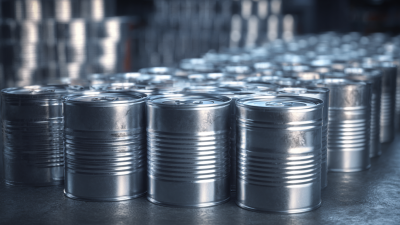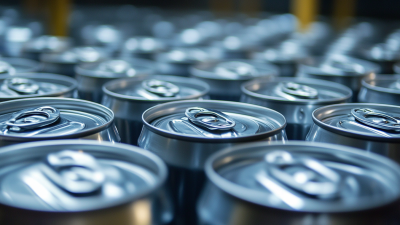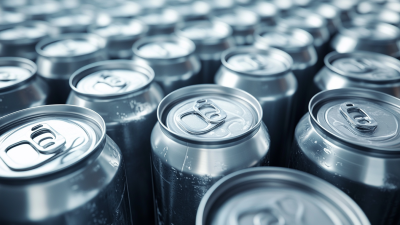 +8618680445103
+8618680445103
Free Standard Samples can be provided for you to check the quality.
Leave Your Message
In recent years, the beverage industry has witnessed a significant shift towards sustainable packaging solutions, with metal cans emerging as a clear front-runner. According to a 2022 report by the Beverage Marketing Corporation, metal cans accounted for over 50% of the total beverage packaging market, driven by their recyclability and lightweight nature. These attributes not only appeal to environmentally conscious consumers but also contribute to lower transportation costs and longer shelf life for beverages. Furthermore, a study by the Aluminum Association indicates that a staggering 75% of all aluminum ever produced is still in use today, highlighting the enduring value and sustainability of metal cans. As brands increasingly recognize the benefits of metal cans, exploring effective strategies to boost sales in this dynamic market is crucial for success in a competitive landscape.

In the rapidly evolving beverage industry, innovative packaging designs are crucial for capturing consumer attention, especially as environmental awareness continues to rise. One significant trend emerging is the adoption of green packaging solutions, which are increasingly appealing to eco-conscious consumers. Brands are now facing pressure to incorporate sustainable materials that not only minimize environmental impact but also resonate with a growing demographic that prioritizes responsibility in their purchasing decisions.
For instance, integrating materials like recycled aluminum or biodegradable substances into metal can designs can bolster brand image while simultaneously addressing consumer demands for sustainability. Companies that leverage these strategies are not only enhancing their appeal but also differentiating themselves in a crowded market. As seen in successful marketing campaigns globally, environmentally friendly packaging is becoming more than just a trend; it’s transforming into a standard that sets brands apart and fosters loyalty among clientele who are eager to support brands aligned with their ethical values.
As sustainability becomes a cornerstone of consumer choice, beverage companies must adopt eco-friendly practices to appeal to environmentally conscious shoppers. Metal cans, known for their recyclability and reduced carbon footprint compared to glass or plastic, are poised to benefit from this shift. By promoting the environmental advantages of metal cans, brands can attract a growing demographic that prioritizes sustainability in their purchasing decisions.
Incorporating sustainable practices not only enhances brand reputation but also meets regulatory expectations and consumer demand for responsible sourcing. Utilizing recycled materials in production and implementing efficient manufacturing processes can significantly lower resource consumption. Furthermore, engaging customers with educational campaigns about the recyclability of metal cans reinforces the message of sustainability, fostering loyalty among eco-conscious consumers who value brands that align with their values. By aligning sales strategies with sustainable trends, companies can position themselves as leaders in innovation while increasing market share in the competitive beverage industry.
In the competitive landscape of the beverage industry, marketing campaigns tailored for metal can beverages can significantly enhance sales and brand loyalty. One effective strategy is to leverage eco-conscious messaging. As consumers become increasingly aware of environmental issues, emphasizing the recyclability and sustainability of metal cans can resonate well. Campaigns that highlight the eco-friendly aspects of packaging, combined with a clear call to action for recycling, can attract environmentally-minded customers and create a positive brand image.
Another potent strategy is engaging consumers through social media platforms. Interactive campaigns that encourage users to share their experiences with metal can beverages can amplify brand visibility. For instance, hosting contests or creating shareable content that showcases unique serving ideas or recipes can drive participation and engagement. Collaborating with influencers who align with the brand’s values can also help tap into diverse audiences and generate excitement around new product launches or seasonal promotions. By employing these targeted marketing tactics, beverage brands can effectively boost their metal can sales and foster a loyal consumer base.
To maximize market reach in the beverage industry, enhancing distribution channels is crucial for boosting metal cans sales. A well-structured distribution strategy ensures that products are readily available where consumers are most likely to purchase them. Partnering with a diverse range of distributors, including wholesalers, retailers, and online platforms, can significantly expand a brand’s footprint. Additionally, focusing on regional distributors can help tap into local markets effectively, catering to specific consumer preferences and trends.
Furthermore, leveraging technology in distribution can streamline operations and improve inventory management. Implementing supply chain management systems and data analytics can provide valuable insights into consumer behavior, leading to more informed decision-making. By optimizing logistics and ensuring timely deliveries, brands can enhance their reliability in the eyes of retailers and consumers alike. Offering promotions and incentives to distributors who successfully move metal cans can also create a win-win situation, driving sales while fostering stronger partnerships within the industry.

In the highly competitive beverage industry, leveraging consumer feedback can be a game-changer for boosting metal can sales. Engaging directly with customers through surveys, social media, and reviews allows brands to understand their preferences and expectations better. This insight is crucial for continuous product improvement and enables businesses to adapt their offerings to meet emerging trends. For instance, if consumers express a desire for eco-friendly packaging or specific flavors, brands can quickly pivot their product development strategies to incorporate these insights, ensuring they stay ahead of the competition.
Moreover, actively soliciting and responding to consumer feedback fosters a sense of community and loyalty among customers. When consumers feel their opinions are valued and reflected in the product, they are more likely to develop a lasting connection to the brand. Implementing changes based on feedback not only demonstrates that a company is attentive and responsive but can also lead to improved customer satisfaction and retention. As the beverage industry continues to evolve, prioritizing consumer input in product development will be essential for maximizing sales and ensuring long-term success in the metal can market.







